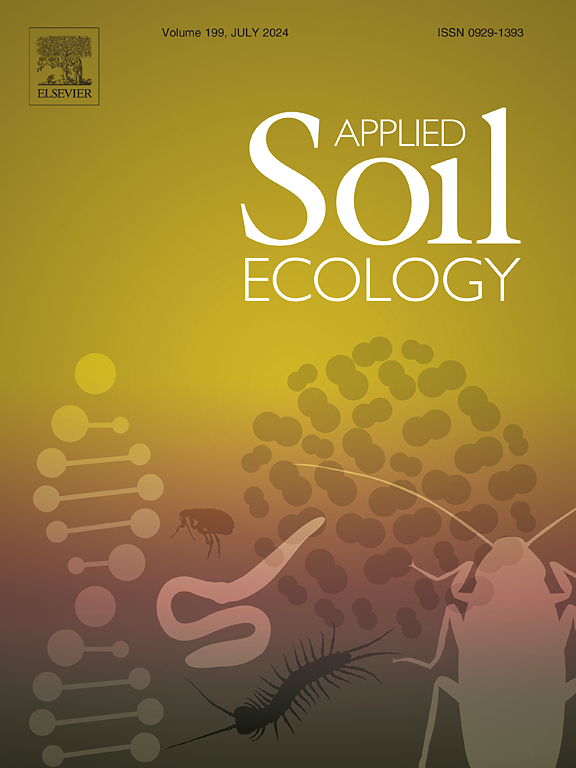Rice cultivation in saline-alkaline soil shifts the coupling of phosphorus functional genes and salt tolerance genes based on metagenomic analysis
IF 4.8
2区 农林科学
Q1 SOIL SCIENCE
引用次数: 0
Abstract
Rice cultivation in saline-alkali soil can improve soil fertility and microbial activity. How this impacts the relative abundance of salt tolerance genes and phosphorus (P) cycling genes in soil, and their relationship, remains unclear. We studied the physicochemical and microbial properties of barren saline-alkali wasteland soil (WL) and saline-alkali wasteland cultivated with rice for 10, 21, or 30 years, in the Sognen Plain of northeastern China. Our results exhibited that rice cultivation in saline-alkaline soil reduced the saline-alkali properties of soil and mitigated osmotic stress to microorganisms. Rice planted in saline-alkaline soil reduced the abundance of microbial salt tolerance genes and the network interactions between salt tolerance and P cycling genes. Compared to 10-year and 21-year rice-planted saline-alkaline soils, rice planted 30 years ago had increased content of labile P, moderately labile P and organic P, resulting the decreases of the relative abundance of genes for organic P mineralization (phoD) and inorganic P solubilization (gcd) and the increase in the relative abundance of genes for low-affinity inorganic phosphate transporters (pit). Additionally, long-term rice cultivation decreased soil pH, leading to a decrease of abundance of inorganic P solubilization genes. The increase of soil P availability mitigated P limitation, resulting in the complexity of the P cycling gene network in 21-year and 30-year cultivated plots lower than in 10-year plot. These results suggest that reclamation of saline land for rice alleviates the effects of soil salinity on microbial activities, enhances soil P availability, and reduces the interaction of P cycling and salt tolerance genes, promoting the microbial P assimilation in soil.

基于宏基因组分析的盐碱地水稻栽培改变了磷功能基因与耐盐基因的耦合
盐碱地种植水稻可以提高土壤肥力和微生物活性。这如何影响土壤中耐盐基因和磷循环基因的相对丰度,以及它们之间的关系尚不清楚。研究了甘肃索根平原盐碱荒地土壤(WL)和种植水稻10年、21年和30年盐碱荒地土壤的理化和微生物特性。结果表明,盐碱土壤中种植水稻降低了土壤的盐碱性质,减轻了微生物的渗透胁迫。盐碱地种植降低了水稻微生物耐盐基因的丰度,降低了耐盐基因与磷循环基因之间的网络相互作用。与10年和21年盐碱地相比,30年前种植水稻的土壤中活性磷、中度活性磷和有机磷含量增加,导致有机磷矿化(phoD)和无机磷增溶(gcd)基因相对丰度降低,低亲和无机磷转运体(pit)基因相对丰度增加。此外,长期种植水稻降低了土壤pH值,导致无机增磷基因丰度降低。土壤磷有效性的增加缓解了磷的局限性,导致21年和30年耕地磷循环基因网络的复杂性低于10年耕地。综上所述,盐碱地垦殖水稻缓解了土壤盐分对微生物活性的影响,提高了土壤磷有效性,减少了磷循环与耐盐基因的相互作用,促进了土壤微生物对磷的同化。
本文章由计算机程序翻译,如有差异,请以英文原文为准。
求助全文
约1分钟内获得全文
求助全文
来源期刊

Applied Soil Ecology
农林科学-土壤科学
CiteScore
9.70
自引率
4.20%
发文量
363
审稿时长
5.3 months
期刊介绍:
Applied Soil Ecology addresses the role of soil organisms and their interactions in relation to: sustainability and productivity, nutrient cycling and other soil processes, the maintenance of soil functions, the impact of human activities on soil ecosystems and bio(techno)logical control of soil-inhabiting pests, diseases and weeds.
 求助内容:
求助内容: 应助结果提醒方式:
应助结果提醒方式:


